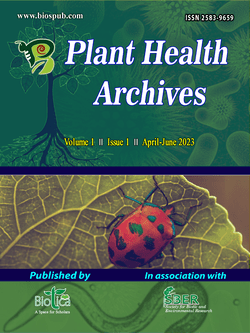
Biological Control of Plant Parasitic-Nematodes by Plant Growth Promoting-Rhizobacteria
Selvaraj Anandakumar*
Dept. of Agricultural Microbiology, CCM, TNAU, Coimbatore, Tamil Nadu (641 003), India
Gothandaraman Rajadurai
Dept. of Plant Biotechnology, CPMB, TNAU, Coimbatore, Tamil Nadu (641 003), India
DOI: https://doi.org/10.54083/PHA/1.1.2023/05-07
Keywords: Biocontrol, PGPR, Plant health, Plant parasitic-nematodes
Abstract
Plant growth promoting-rhizobacteria (PGPR) contributes a significant part in crop health improvement including pest management. It also protects plants from parasitic nematodes damage by exhibiting biocontrol activity besides improving the growth of plants by supplying nutrients, producing phytohormones and inducing modification of plants metabolisms. PGPR decreases or inhibits the hatching of nematode juveniles and suppresses the nematodes development and reproduction by exhibiting various mechanisms such as hyperparasitism, antibiotic synthesis or antibiosis, substrate competition, synthesis of lytic enzymes and induction of resistance in plants. Hence, PGPR could be an efficient biological protective agent that protects agricultural and horticultural crop plants from the infestation of parasitic nematodes.
Downloads
not found
Reference
Aioub, A.A.A., Elesawy, A.E., Ammar, E.E., 2022. Plant growth promoting rhizobacteria (PGPR) and their role in plant-parasitic nematodes control: a fresh look at an old issue. J. Plant Dis. Prot. 129, 1305-1321. DOI: https://doi.org/10.1007/s41348-022-00642-3.
Gowda, A.P.A., Pankaj, Singh, D., Singh, A.K., Sowmya, R., 2022. Nematicidal potential of plant growth-promoting rhizobacteria against Meloidogyne incognita infesting tomato under protected cultivation. Egypt. J. Biol. Pest Control. 32, 1-13. DOI: https://doi.org/10.1186/s41938-022-00643-2.
Subedi, P., Gattoni, K., Liu, W., Lawrence, K.S., Park, S.W., 2020. Current utility of plant growth-promoting rhizobacteria as biological control agents towards plant-parasitic nematodes. Plants 9, 1167. DOI: https://doi.org/10.3390/plants9091167.
Xiang, N., Lawrence, K.S., Kloepper, J.W., Donald, P.A., McInroy, J.A., 2017. Biological control of Heterodera glycines by spore-forming plant growth-promoting rhizobacteria (PGPR) on soybean. PloS One 12, e0181201. DOI: https://doi.org/10.1371/journal.pone.0181201.
